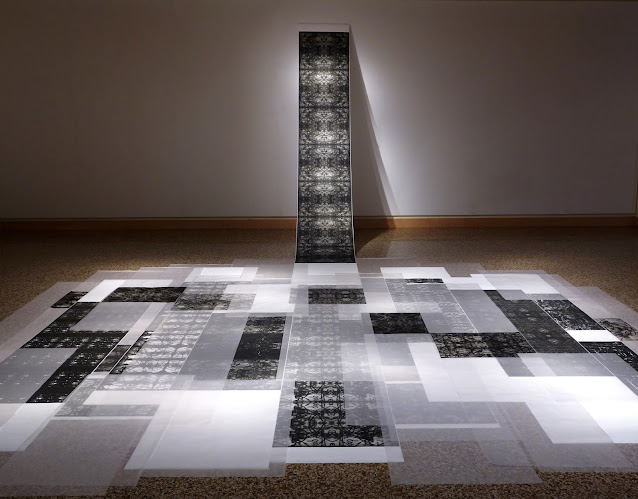Happy New Year. I hope the 2021 will bring bright hopes, good health, peace and justice for all of us. As I write this, my mind is on Georgia right now.
Looking back on the epic year 2020, the highlight of my artistic activities was being able to install a solo show. Such things are difficult during the pandemic, but I enjoyed every minute of installing the show while wearing a mask. I was re-energized with this prospect of sharing my work with people (in-person and in real space) and realized how important it was for me to feel connected this way. Even though the exhibit was open to the Rivers School community only, but not to the public due to the Covid-19 pandemic, the exhibit was enjoyed by students and faculty at the Rivers School. I particularly enjoyed several positive comments from the students while I was installing “Field Notes, II,” a room-size installation in one of the galleries.

Field Notes, II
Archival pigment print on Tyvek and vellum
98"x 240"x 180"
2016 - 2020
In order to share my work beyond the Rivers School community, I created a virtual exhibit site, so that anybody can view the exhibit from the comfort of their home.
“Mapping” opened at the Rivers School in Weston, Massachusetts on October 19th.
 |
| "Extinction Studies" series |
As an artist, making art in the studio has been tremendously
helpful for me in sustaining a sense of normalcy in my life during the
pandemic. My work kept me grounded, so to speak, literally working on a drawing
on the floor every day. The life of confinement also gave me new ways of
thinking and looking at my old work, and I saw it as an opportunity to
experiment with my old work.
I presented a couple of new works and new “old” works in this exhibit. The new works
are two map drawings from “Extinction Studies” series that are based on
historical maps of the Adirondacks in northern New York state.

Two new “old” pieces came out of my reflection on science and belief during the pandemic. “Field Notes, II” is an installation that is composed with images of scientific writings that were hand traced from the whiteboards during my residency at the Broad Institute of MIT and Harvard in 2016–2017. While there I learned that science is rigorous. Scientific knowledge as we come to know it is the result of countless days, months, and years of experiments by scientists working in the lab. Science, as I observed, is driven by the desire to understand the unknown and the courage to go in search of things that might not be knowable. This was where I, as an artist, felt closely in sync with scientists about the way we do our work. This installation, “Field Notes, II,” with layers of the scientific ideas and writings being laid on the floor, calls attention to what makes the groundwork for future scientific discoveries.
When there are no treatments available, what do we do, where do we go, and how
do we deal with the disease, both physically and mentally? I have been asking
myself these questions since the pandemic started. We’ve been living with these
questions for several months now. In “Accrescence,”
which means continual growth, magic spells from ancient medical papyrus were
deployed to create new meanings. I included these magic spells in my work
in the past, but the pandemic made me go back to them and look at them in a
different way. In this iteration, magic spells (laser cut on vellum) are
presented by layering old and found papers that have histories and meanings for
me into new and singular works. In this work, layering became important to me.
Adding layers of histories to these magic spells, our desire to want to believe
in medical treatment is never lost then or now, whether magic spells for
ancient people or prayers and hope for vaccines during the pandemic in the 21st
century. To me, these pieces speak quietly as a prayer.

Accrescence
Installation view
Laser cut on vellum and found papers
Approx. 20"x 14" each
2016-2020
Mapping is one way we come to understand the world by organizing and
systemizing layers of information. This organizing helps us understand the
scope of data and information in a visual way. But maps do not remain
unchanged. To an artist, maps are starting points for new interpretations,
experiments, inventions, and actions. In this exhibit, I presented several
different bodies of work that are related to mapping and maps. The collecting
and organizing of layers of information in science, and the weaving of
histories can be seen as my attempt to understand the unknown as well as the
time we are in.
Thank you for reading and for your ongoing support.
Please stay safe and healthy.
